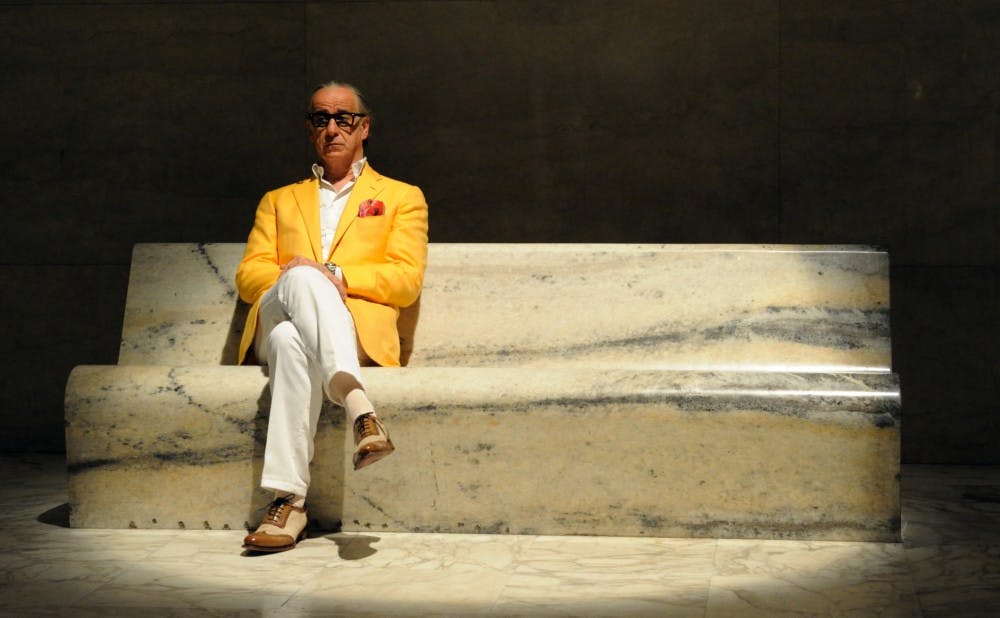Dir. Paolo Sorrentino
Janus Films
4.5/5 stars
A group of women look out over Rome and sing in unison, ethereal and ominous. The city looks as though it has just risen. Japanese tourists follow their guide, and one elderly man walks toward the balcony. He snaps a photo of the horizon—Rome, as lush and golden, as immortal and touristic as ever—and he smiles, relishing the sincere and transcendent moment of joy. Then he dies.
So begins Sorrentino’s “The Great Beauty,” a film that toes the line between the fantastical daydream and the absurd gimmick. We are introduced to writer Jep Gambardella (Toni Servillo). Since writing his first (and, as we will be frequently reminded, only) novel, “The Human Apparatus,” he has cemented his position as one of Rome’s greatest socialites, part of an aging group of thinkers and celebrities who no longer know what to do with themselves. He’s turning 65, so he indulges in a lavish rooftop party. The attendees turn garish in their bright makeup and gaudy clothing. As the bodies jump and dance, the camera inverts or moves in rhythm until the partiers become nothing but pulsing, grimacing shapes.
By now, we’ve already been well introduced to his poetic and unpretending interior dialogue: “…I answered, ‘The smell of old people's houses.’ The question was, ‘What do you really like the most in life?’…I was destined to become a writer. I was destined to become Jep Gambardella.”
We find that Jep is looking for something exquisite and real—the beauty that Rome has failed to give him. He’s left instead on the brink of despair with only one novel to show for it. We meet the over-the-top characters, superficial and archetypal, yet the main characters—Jep and those who are dear to him, whether he realizes it or not—are relatable. There’s Jep’s maid, who looks after him in more ways than one; Ramona, a stripper; Dadina, Jep’s dwarf editor. And then there is Romano, who, while a little foolish, is also one of the most sentimental and honest characters, and perhaps Jep’s only true friend.
The film is peripatetic. It moves from long shots of characters sipping alcohol and arguing about the future of Italy to quick, illusory flashbacks of a young Jep at the beach. There’s the scene of a young girl who, while crying, throws a bucket of paint against a huge canvas, smudging the paint on the canvas and on herself into a disturbing brown before we see the bold and colorful end product. There’s the night when Jep and Ramona visit all of Rome’s most prized buildings and monuments, thanks to a serious bespectacled young man who is “friends with princesses” and therefore has all the keys to the city. In these moments, we witness the surprising, the inventive and the thrilling, all in the name of the search for beauty. Jep’s commentary throughout remains on point, and the overall dialogue is both dark and lighthearted, at some points brilliant (what with lines like “modernity is bad ass”) and at other times incongruous. But the accompanying script is almost of less importance; it’s the sights and sounds and atmosphere of Rome that bring us in and make us feel alive.
There are the several sudden deaths, too, depicted only briefly in the film: Jep comforts the husband of his long-lost young love, he breaks down while carrying the coffin of a friendless youth, he lays listlessly in bed and stares at his ceiling. The brevity with which the film conveys death is a flippant shrug to our own mortality, a backdrop for Jep’s own candid revelations.
Never once does a scene bore. The camerawork ensures our captivation. Each scene is deliberate, beautiful not because of the actual Roman scenery (which is stunning and significant in its own right) but because of the subtle portrayal of its subject: Jep with a cigarette hanging out of his mouth, Jep as he melds into a crashing party, Jep as he washes his face in the fountain. The film is one idyllic sensation after another, a realm of fantasy, a series of delightful enchantments to the audience that are otherwise lost on Jep. It’s a classic tale of the artist who can no longer create or find meaning because he has lost, or has never found, the beauty he seeks—an artist who is more fearful than he admits. It’s a film of casual melancholy, of wandering, and yet beauty—the great beauty, the beauty of Rome that Jep had grown numb to—is ready to overwhelm once more.
Get The Chronicle straight to your inbox
Signup for our weekly newsletter. Cancel at any time.

